This article explains how to install MyBB with Apache on Ubuntu 24.04.
MyBB is an open-source forum software that facilitates online discussions and community building. It offers features like user management, customizable themes, plugins, and moderation tools, making it ideal for creating and managing online forums.
Ubuntu is a reliable Linux distribution suitable for your forum. Apache is a robust, widely-used web server with strong security features, ideal for serving PHP-based applications like MyBB.
Installing MyBB with Apache on Ubuntu combines a user-friendly forum platform with a secure, scalable server environment. This setup is perfect for individuals aiming to host a reliable, customizable online community with minimal overhead.
Install Apache HTTP server on Ubuntu
MyBB requires a web server. This post will install and use the Apache web server to run MyBB.
To do that, open the Ubuntu terminal and run the commands below to install the Apache web server.
sudo apt update
sudo apt install apache2
Once Apache is installed, the commands below can start, stop, and enable the Apache web server to start automatically when your server boots up.
sudo systemctl stop apache2
sudo systemctl start apache2
sudo systemctl enable apache2
You can test that the Apache web server is running by opening your web browser and browsing to the server’s localhost or IP address.
http://localhost
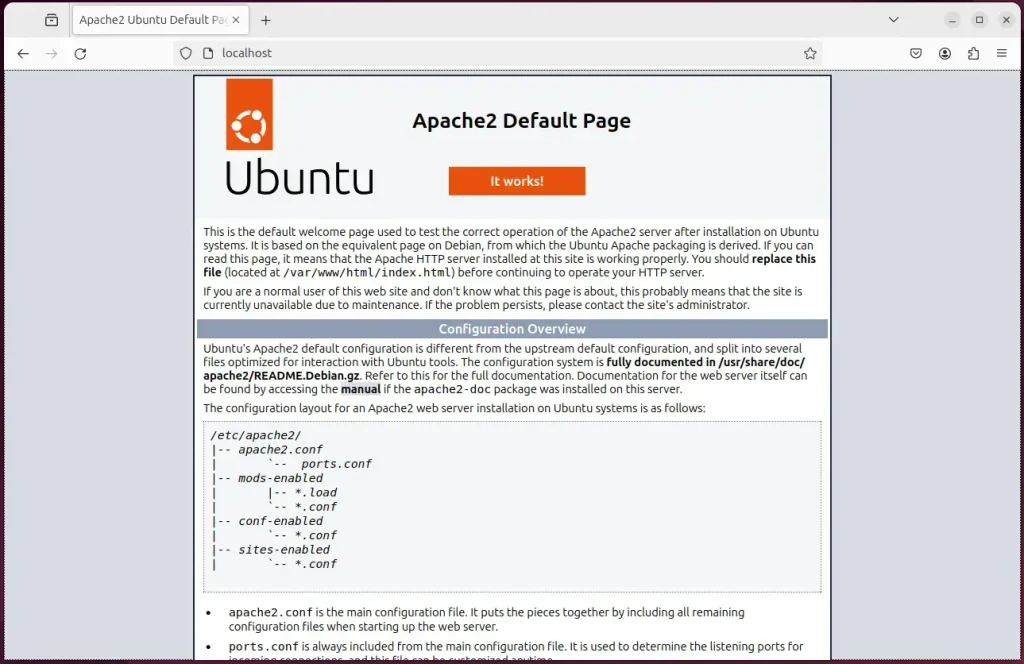
When you see the Apache2 Default Page, it means the Apache HTTP server is successfully installed.
Additional help on installing Apache on Ubuntu is in the link below.
How to install Apache on Ubuntu
Install the MariaDB database server on Ubuntu
The next component required to run MyBB is a database server. This post will install and use the MariaDB database server.
To install and use the MariaDB database server, use the instructions below.
Open the Ubuntu terminal and run the commands below to install the MariaDB database server.
sudo apt update sudo apt install mariadb-server
Once the MariaDB database server is installed, use the commands below to stop, start, and enable the MariaDB server to start automatically when the server boots.
sudo systemctl stop mariadb sudo systemctl start mariadb sudo systemctl enable mariadb
Run the following commands to validate and test if the MariaDB database server is installed successfully.
sudo mariadb
Once you run the commands above, it will log you onto the MariaDB console and display a message similar to the one below.
Welcome to the MariaDB monitor. Commands end with ; or g. Your MariaDB connection id is 32 Server version: 10.11.2-MariaDB-1 Ubuntu 23.04 Copyright (c) 2000, 2018, Oracle, MariaDB Corporation Ab and others. Type 'help;' or 'h' for help. Type 'c' to clear the current input statement. MariaDB [(none)]>
The message tells you that the server is installed successfully.
Additional help on installing MariaDB.
Create a MyBB database
Upon successfully installing the MariaDB database server, create a blank database on the server specifically for the MyBB application.
As part of the setup, we will create a mybbdb database and a user account called mybbdbuser.
Finally, we’ll grant the mybbdbuser full access to the mybbdb database.
All the database steps above can be done using the commands below:
But first, log on to the MariaDB database server:
sudo mariadb
Then run the commands below to complete the steps:
CREATE DATABASE mybbdb CHARACTER SET utf8mb4 COLLATE utf8mb4_general_ci;
CREATE USER mybbdbuser@localhost IDENTIFIED BY 'type_your_password_here';
GRANT ALL ON mybbdb.* TO mybbdbuser@localhost WITH GRANT OPTION;
FLUSH PRIVILEGES;
exit
Ensure to replace ‘type_your_password_here ‘with your password.
Install PHP on Ubuntu Linux
The last component you will need to run MyBB is PHP. The MyBB application is PHP-based and supports the latest versions of PHP.
Then, run the commands below to install the latest PHP version.
sudo apt install php libapache2-mod-php php-intl php-mysql php-curl php-cli php-zip php-xml php-gd php-common php-mbstring php-xmlrpc php-bcmath php-json php-sqlite3 php-soap php-zip php-ldap php-imap
Additional help on installing PHP
How to install PHP on Ubuntu Linux
Download MyBB files
Let’s begin downloading and configuring the MyBB files on Ubuntu Linux.
To always install the latest version, check the download page for mybb. Get the download link and download the archived package to your computer. Then, extract it.
First, navigate to the /tmp/ directory and download the MyBB files. Next, extract the content into the MyBB folder in the Apache root directory.
The final step is to change the permissions. This will allow the Apache web server to interact safely with the files, ensuring a secure environment for your MyBB installation.
Next, run the commands below to change Apache root folder permissions so the MyBB app can function correctly.
cd /tmp
wget https://resources.mybb.com/downloads/mybb_1838.zip
sudo unzip mybb_*.zip -d /var/www/mybb
sudo chown -R www-data:www-data /var/www/mybb/
Once you have completed all the above steps, continue configuring the Apache web server below to serve the MyBB content.
Run the commands below to create an Apache virtual host file for MyBB.
sudo nano /etc/apache2/sites-available/mybb.conf
Then, copy and paste the content block below into the Apache server block.
<VirtualHost *:80>
ServerName mybb.example.com
ServerAdmin [email protected]
DocumentRoot /var/www/mybb/Upload
<Directory /var/www/mybb/Upload/>
Options FollowSymlinks
AllowOverride All
Require all granted
</Directory>
ErrorLog ${APACHE_LOG_DIR}/error.log
CustomLog ${APACHE_LOG_DIR}/access.log combined
</VirtualHost>
Save the file.
Then, run the commands below to enable the virtual host and restart the Apache server.
sudo a2ensite mybb.conf
sudo a2enmod rewrite
sudo systemctl restart apache2
Setup Let’s Encrypt SSL/TLS for MyBB
You may want to install an SSL/TLS certificate to secure your MyBB site. Secure your MyBB installation with HTTPS from Let’s Encrypt.
Please read the post below for additional resources on installing and creating Let’s Encrypt SSL certificates for Apache.
How to set up Let’s Encrypt SSL certificate for Apache on Ubuntu Linux
Once you have restarted the Apache web server, open your browser and browse to the server hostname or IP address defined in the Apache server block.
http://mybb.example.com
The MyBB installation wizard should appear.
Click Next to begin the installation.
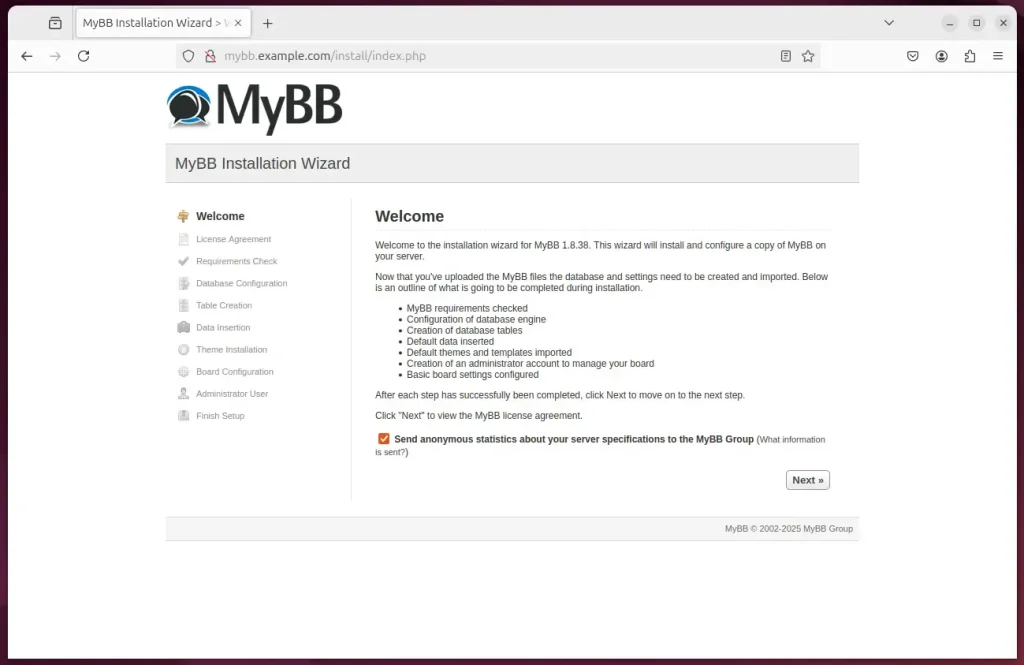
Type in the database name and password, then click Next.
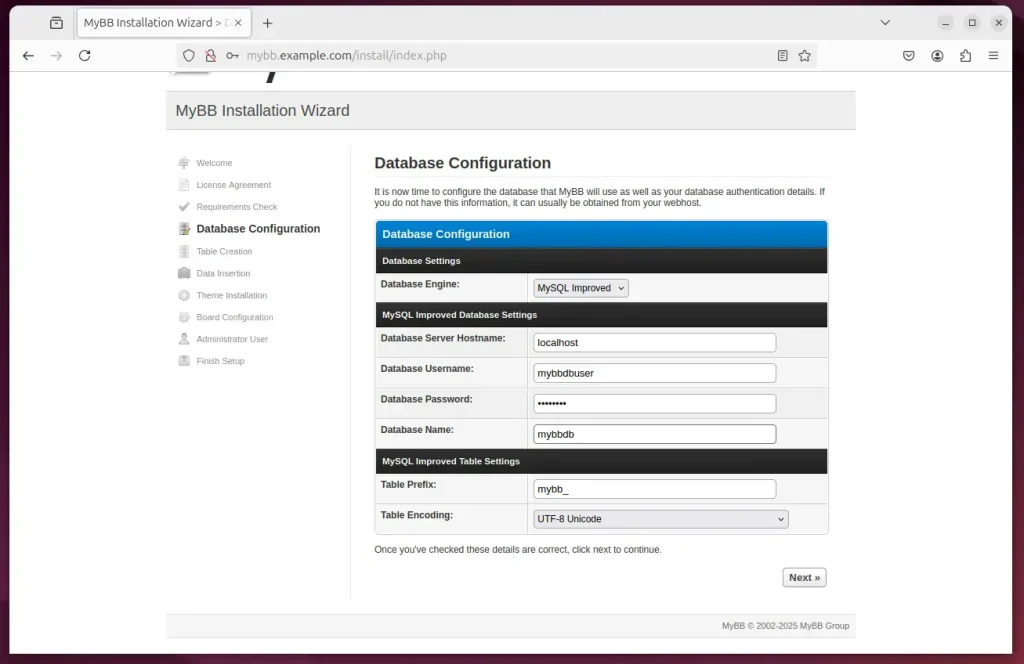
Next, configure your forum details and continue.
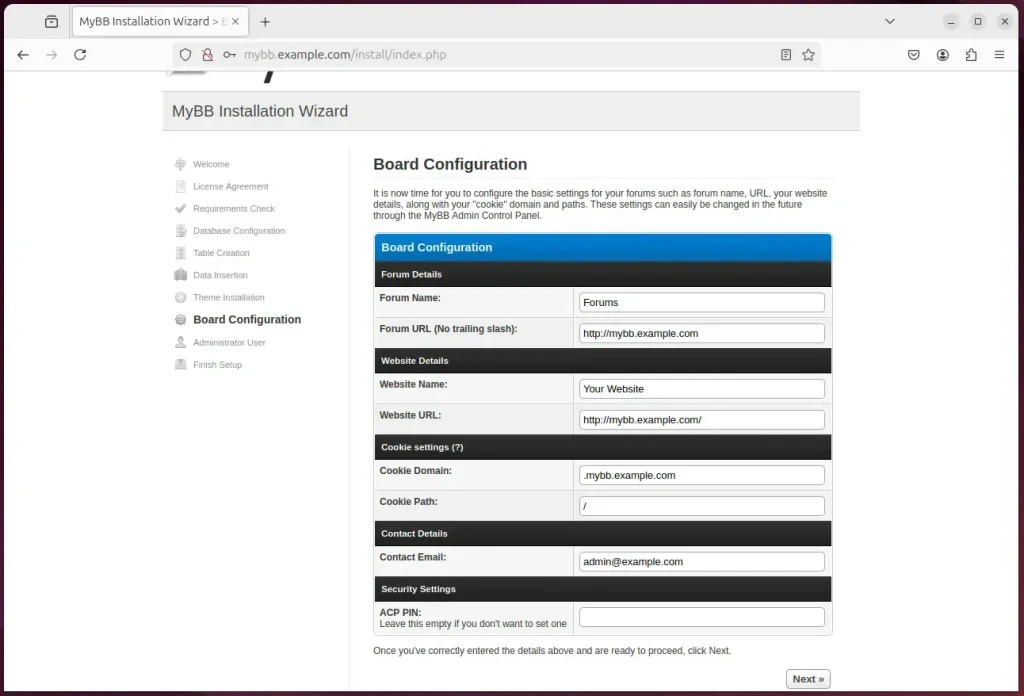
Create an admin account and continue.
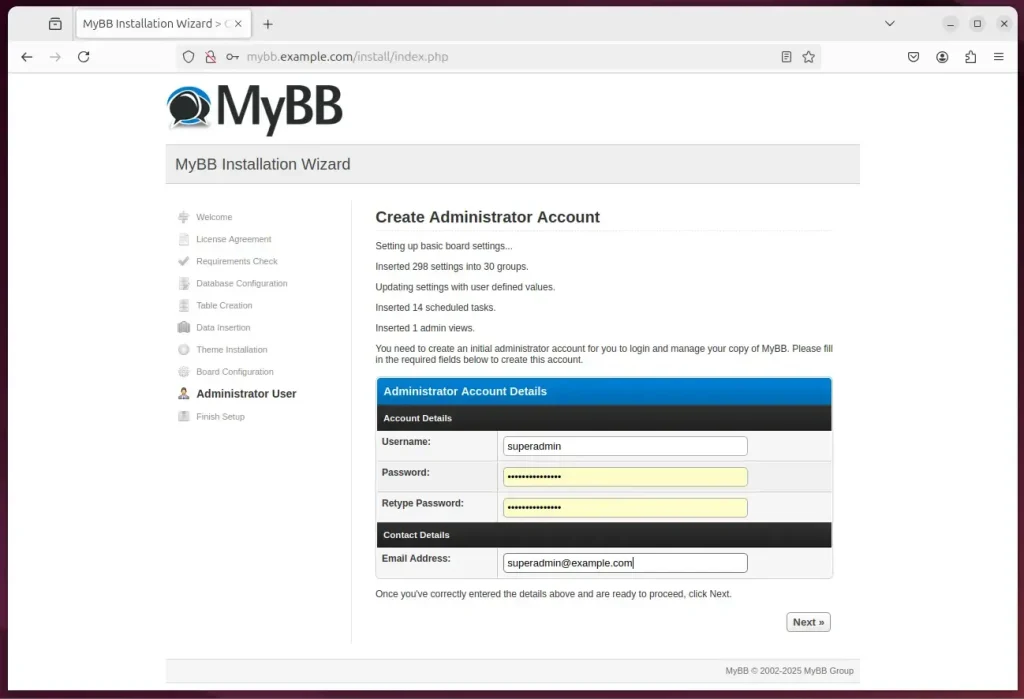
MyBB should be ready to use.
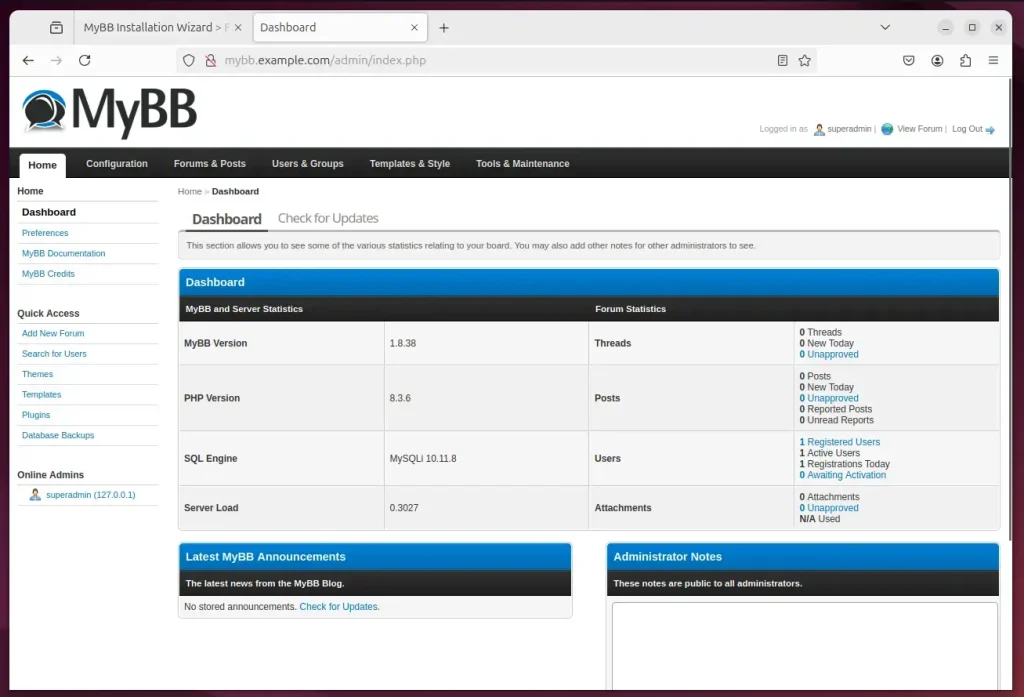
That should do it!
Conclusion:
Setting up MyBB with Apache on Ubuntu provides a solid foundation for launching your online forum. Here are the key takeaways:
- MyBB Installation: A straightforward process thanks to the open-source nature of MyBB.
- Robust Server Environment: Using Apache and Ubuntu ensures a reliable and secure platform.
- MariaDB Integration: Efficient database management through MariaDB enhances performance and reliability.
- PHP Support: Ensuring compatibility with the latest PHP versions allows for a smooth user experience and access to new features.
- Security with SSL/TLS: Implementing Let’s Encrypt SSL certificates secures your forum and instills trust among users.
- Community Building: With MyBB, you can foster engaging discussions and build a strong online community.
Following the outlined steps will help you successfully navigate the installation process and create a thriving online space for users.

Leave a Reply